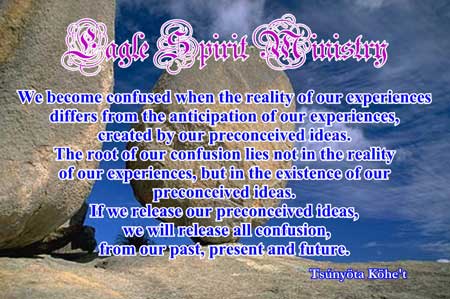 |
 |
||

|
|||
 |
|||
 |
|||
| By El Collie. | |||
| Prior to 1991, I’d believed that only devout spiritual adepts who followed rigorous disciplines could have Kundalini awakenings. I had imagined that this harrowing but ultimately benevolent process was the reward of unremitting and recognizable spiritual effort. When my own Kundalini arose, this and many more of my long held assumptions were blown to pieces. I began meeting others who were in the midst of dramatic Kundalini awakenings. Not one of these people fit ‘the profile’ before their awakening. We had all been highly sensitive people; most of us had experienced some degree of psychic awareness earlier in our lives. We’d all had a hunger for communion with life/God/others and a desire to learn about the mysterious and magical side of existence which surpassed what we knew of our mainstream peers. Here the similarities between us ended. Our personal backgrounds, ages, race, gender and lifestyles were diverse. Some of us had previous exposure and/or interest in Eastern religious practices, such as yoga, meditation and spiritual studies. Some had adhered to Judeo/Christian beliefs, others were involved in New Age systems. |
|||
 |
|||
| While some had experimented heavily with mind-altering drugs, others had little or no drug experience. Apparently, whatever our numbers, those of us in radical transformation are everywhere. We occupy every strata of society. This was one of the greatest obstacles to distributing our newsletter: we wanted to make ‘Shared Transformation’ available to all who need it, but those of us undergoing profound psychospiritual processes are comparatively few and far flung. We can’t be found on any mailing list or in any specific interest group or community. There is no telling just how many of us there are, or where we are. I’d imagined that there would be more of us found in places like imported Eastern religious centres, especially those whose teachings centre on the raising of the Kundalini. To my astonishment, I discovered this was untrue. At one point in my own awakening, I called such a local ashram for a referral to a dentist who could deal with my involuntary mudras and kriyas. |
|||
|
|
|||
| Those at the centre told me they
didn't give referrals; furthermore, they did not know of anyone locally;
devotee or otherwise, who had actually had a Kundalini awakening. Most of these Eastern religions teach that Kundalini is awakened through the guru; usually by a transmission of spiritual energy known as 'shaktipat'. A few of those I know in transformational processes had received shaktipat from such gurus; often decades prior to their awakening. Was this a factor? None of us knew exactly what 'set off' our Kundalini awakenings. In several cases, traumatic events such as the death of a loved one or a physical accident seemed to precede the most severe Kundalini symptoms. In other cases, like my own, there was no evident external trigger. Nor do we all experience psychospiritual crisis in the same way. For some, the process begins with a sublime mystical revelation. For others, it is not until relatively late in the process that mystical and paranormal events occur. For many, the initial stages bring extreme physical, mental or emotional distress. |
|||
 |
|||
| Even the length of the process
has great variation. For some, it may last a few days or weeks. For others,
it goes on unabated for many years. Even those with shorter experiences
may find that such brief but intense episodes recur in their lives during
a five to twenty year period. Those who have had relatively short and easy (and often partial) awakenings frequently make the false assumption that everyone's process should conclude quickly. There is a strong, unfortunate tendency to believe that the way one's own unfolding occurred is precisely the way it must be for everyone else. Such narcissistic thinking leads to all sorts of useless criticism, erroneous judgment and poor advice. Everyone I know who has undergone a prolonged Kundalini awakening has been told by at least one professed 'expert' that he or she was definitely not experiencing Kundalini. People who have never themselves had any sort of transformational experience are often more eager and arrogant in spelling out what is a 'real' process than those who have actually gone through it themselves. |
|||
 |
|||
In addition to all the confusing mixed messages we receive from others, we often have our own internalized prejudices that add to our doubt. In my own case, I had a hard time feeling worthy of my awakening, because I didn't feel that I was 'advanced' enough to merit such a gift. Like many others, I had bought into the idea that only saints experienced radical flowering of consciousness. The following list is a barrage of common stereotypes that have been hurled at me and others I know undergoing transformation: |
|||
|
|||
 |
|||
All of these assumptions are simply untrue. Those who have transformational experiences don't fit into any one mold or myth. 'Decadent' bleached blondes with flashy wardrobes and lots of makeup are no less likely to undergo spiritual awakening than neo-Amish type virgins. Those who meticulously follow ordained spiritual practices appear to have no advantage over those who adhere to no specific regime. Even spiritual aspirants and faithful believers aren't exclusive prospects; atheists and agnostics can and Do have profound psychospiritual experiences. These facts elicit shock and outrage from those who have presumed that only seekers in the right wrappings are recipients of divine grace. Those who consider themselves (and their own stereotypes) 'spiritually correct' are often more antagonistic toward spiritual emergence in anyone who doesn't fit the bill than are the hard-core materialists and sceptics who disdain anything spiritual. |
|||
 |
|||
Those who have spent their lives in pursuit of dogmatic spiritual perfection are also most likely to try to commandeer someone else's process, giving irrelevant instructions and unnecessary dire warnings. The prevailing but mistaken belief that spirituality is always a positive and uplifting experience does untold harm to those of us enduring the very real agonies of spiritual evolution. Doctors with little or no experience with violent Kundalini awakenings insist that we are suffering from 'religious delusions' and try to pigeonhole us with demoralizing psychiatric labels. Anyone familiar with the psychospiritual histories of the most beloved and renowned spiritual luminaries of our time (Krishnamurti, Swami Muktananda, Ram Dass, etc.) realizes that severe physical and mental disturbances are a commonly reported part of the transformational process. |
|||
 |
|||
The idea that a Kundalini awakening is supposed to be a carefully controlled spiritual exercise arises primarily from the yogic literature which promotes self-induced (and nearly impossible to achieve) awakening. Those of us who are undergoing spontaneous emergence know that the process has a life of its own. This doesn't mean that it has gone amuck. The majority of the most vital processes in our lives are not ego-controlled (i.e., digestion, respiration, blood circulation, bodily chemistry, etc.), yet we do not find anything objectionable in this. Why then, do we demand that the far more mysterious super conscious processes conform to our limited ideas of what is healthy and productive? Physical or psychological pain are not irrefutable evidence that something has gone wrong. Childbirth is often very painful; infants suffer pain in teething; hormonal changes during puberty and menopause can be physically and emotionally uncomfortable. Yet all of these are natural and necessary processes. |
|||
 |
|||
While other people's judgments can be punitive, the most formidable stereotypes are those we hold against ourselves. Our images of who we 'should' be or what is 'true' begin to crumble as we spiritually expand. For some, the realization that something greater than materialist science and human ingenuity are at work here can be shattering. New realities that break through as consciousness unfurls can be disturbing and bewildering. It can be hard to integrate spontaneous insights and mystical experiences that have no place in one's previously accepted reality model. There can also be vacillations in our personal needs and desires which alarm us. At certain points in the process, those who have been health-conscious or vegetarians find themselves craving 'taboo' foods, such as sweets and meat. People who have been selfless and giving find themselves needing to withdraw and say no to other people's demands. Those who have embraced celibacy or sexual moderation are horrified to discover their passions smouldering. |
|||
 |
|||
These and many other changes in the transformational process can be a torturous inner war if we cling to stereotypes of what is absolutely right, good, or pure. If we think anger is un-spiritual, we'll be mortified when we go through episodes of emotional catharsis. If we have deified certain foods, we'll feel guilty and miserable when our bodies demand that we eat differently. If we have disowned or repressed any part of ourselves, the transformational process is sure to bring these parts back with a vengeance. The more we try to push these 'wrong' parts away, the more painful our struggle. Even improvements in our lives can be unsettling at first. Alan Arkin describes how he reacted when he discovered one morning that his habitual, compulsive and frenetic pattern had dissolved: "After a couple of minutes, when nothing locked into place as an urgent demand, a must do, my reaction was one of terror... Half a dozen things were equally balanced. This ability to choose, calmly and in an orderly way, threw me into a panic." (Halfway Through the Door) |
|||
 |
|||
For those who have tried to be 'good' people, by whatever standard, the most devastating part of the process may come when the 'goodness' is stripped away. I don't believe this happens simply to expose our hidden evil. It's also a dissolution of attachments which are blocking our awareness. It's relatively easy to see the benefit of letting go of greed, malice, deceit, and other negative modes. It's harder to recognize that our ideals and lofty expectations are equal entrapments which bar us from the truth. All the stereotypes, even the beautiful ones, ultimately cripple us. Every preconception limits awareness. If any generalization can be made about spiritual evolution, it is this: It's never quite what we expected it to be. |
|||
 |
|||
 |
|||
 |
|
||||||||